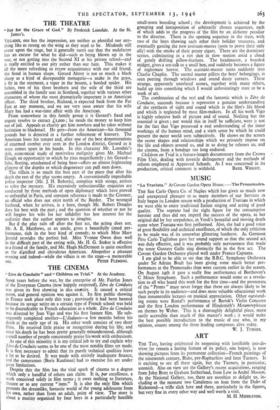THE CINEMA
" Zero de Condulte " and " Children on Trial." At the Academy.
SomE years before the war, by the enterprise of Mr. Fairfax Jones of the Everyman Cinema (now happily reopened), Zero de Conduite was given its first showing in this country. It caused a critical storm, and general opinion was against it. Its first public showing in France took place only this year ; previously it had been banned because its savage satire on a certain type of French school was held to be discreditable to French education as a whole. Zero de Conduite was directed by Jean Vigo and was his first feature film. He sub- sequently completed another—L'Atalante—a few months before his death at the early age of 29. His other work consists of two short films. He received little praise or recognition during his life, and since his death he has been pretty generally misunderstood, although a small number of people consistently praise his work with enthusiasm.
As ojte of this minority it is my critical job to try and explain why Zero de Conduite seems to be one of the most notable films, yet made. It is first necessary to admit that its purely technical qualities leave a lot to be desired. It was made with entirely inadequate finance, and the cameraman (Boris Kaufman) had to exercise his art under great limitations.
Despite this the film has the vital spark of cinema to a degree which only a handful of others can claim. It is, par excellence, a work conceived solely in film terms ; it owes nothing to literature, theatre or to any current " isms." It is also the only film which Presents the dreamlike, fantastic world of the young adolescent from his own, rather than from an adult, point of view. The story is about a mutiny organised by four boys in a particularly horrible
small-town boarding school ; the development is achieved by the grouping and juxtaposition of arbitrarily chosen sequences, each of which adds to the progress of 'the film by an alchemy peculiar to the director. There is the opening sequence in the train, with two of the boys showing each other their holiday treasures, and eventually gassing the new assistant-master (soon to prove their only ally) with the smoke of their penny cigars. There are the dormitory scenes, culminating in a riot shot in slow motion amid a cloud of gently drifting pillow-feathers. The headmaster, a bearded midget, gives a sex-talk to a small boy, and suddenly becomes a figure of nightmare horror. The assistant-master turns .suddenly into Charlie Chaplin. The second master pilfers the boys' belongings, is seen peering through windows and round dusty corners. These strange, apparently unrelated scenes, together with many others, build up into something which I would unhesitatingly state to be a work of art.
The combination of the real and the fantastic which is Zero de Conduite, succeeds because it represents a genuine understanding of the synthesis of sight and sound which is the film's life blood and which is neglected by most film-makers. In all his work Vigo is highly selective both of picture and of sound. Nothing but the essential is given ; nor would this in itself be sufficient, were it not for the fact that Vigo possessed a real understanding of the inner workings of the human mind, and a sixth sense by which he could present the outer world seen subjectively. He shows on the screen the secret shapes and relationships which we privately impose on the life and objects around us, and in so doing he releases us, and the cinema, from a bondage too long endured.
Children on Trial is a feature-length documentary from the Crown Film Unit, dealing with juvenile delinquency and the methods of reform employed at Approved Schools. As I was concerned in its production, critical comment is withheld. BASH, WRIGHT.


























 Previous page
Previous page